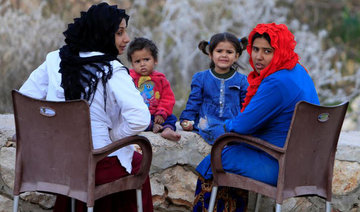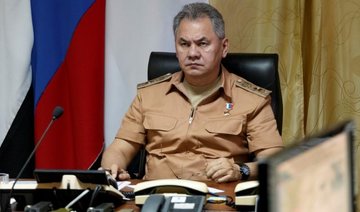GENEVA: Medical evacuations have begun from the Syrian rebel-held enclave of Eastern Ghouta to Damascus, the International Committee of the Red Cross in Syria said early on Wednesday.
Almost 400,000 people in Eastern Ghouta are besieged by forces loyal to President Bashar Assad, and the United Nations has pleaded for his government to allow evacuation of around 500 patients, including children with cancer.
The Syrian American Medical Society (SAMS) said four patients were taken to hospitals in Damascus, the first of 29 critical cases approved for medical evacuation, and the remainder would be evacuated over the coming days.
SAMS advocacy manager Mohamad Katoub said in a tweet that five had been approved for the first group of evacuations, part of a deal on an exchange of detainees between Assad’s government and rebel group Jaish Al-Islam. It was not clear why only four of the five had left.
The Syrian Red Crescent said the evacuations were the result of “long negotiations.” An ICRC spokeswoman declined to give more details, citing the sensitivity of the operation.
On Sunday, Turkish President Tayyip Erdogan said Turkey was working with Russia, Assad’s ally, on the evacuations.
Last week Jan Egeland, the United Nations humanitarian adviser for Syria, said 494 people were on the priority list for medical evacuations.
“That number is going down, not because we are evacuating people but because they are dying,” he said. “We have tried now every single week for many months to get medical evacuations out, and food and other supplies in.”
The United Nations has been waiting for months for the Syrian authorities to provide “facilitation letters” to allow the aid operation to get under way.
Forces loyal to Assad have carried out air raids on Eastern Ghouta, while besieged rebels have fired mortars into neighboring Damascus.
“That has nothing to do with the right of evacuating, and obligation to evacuate civilians (and) wounded,” Egeland said.
Medical evacuations begin from Syria’s Eastern Ghouta -ICRC
Medical evacuations begin from Syria’s Eastern Ghouta -ICRC

Brazil’s Lula accuses Trump of seeking to forge ‘new UN’

- Lula defended multilateralism against what he called “the law of the jungle” in global affairs
- Key US allies including France and Britain have also expressed doubts
BRASILIA: Brazilian President Luiz Inacio Lula da Silva accused Donald Trump on Friday of trying to create “a new UN” with his proposed “Board of Peace.”
The veteran leftist joins other world leaders who have avoided signing up for Trump’s new global conflict resolution organization, where a permanent seat costs $1 billion and the chairman is Trump himself.
“Instead of fixing” the United Nations, “what’s happening? President Trump is proposing to create a new UN where only he is the owner,” Lula said.
Trump unveiled his “Board of Peace” at the World Economic Forum in the Swiss ski resort of Davos Thursday, joined on stage by leaders and officials from 19 countries to sign its founding charter.
Lula defended multilateralism against what he called “the law of the jungle” in global affairs.
His remarks come a day after he spoke by phone with Chinese leader Xi Jinping, who urged his counterpart to safeguard the “central role” of the United Nations in international affairs.
In his remarks on Friday, Lula said “the UN charter is being torn.”
Although originally intended to oversee Gaza’s rebuilding, the board’s charter does not seem to limit its role to the Palestinian territory and appears to want to rival the United Nations.
Key US allies including France and Britain have also expressed doubts.
London balked at the inclusion of Russian President Vladimir Putin, whose forces are fighting in Ukraine after invading in 2022.
France said the charter as it currently stood was “incompatible” with its international commitments, especially its UN membership.














